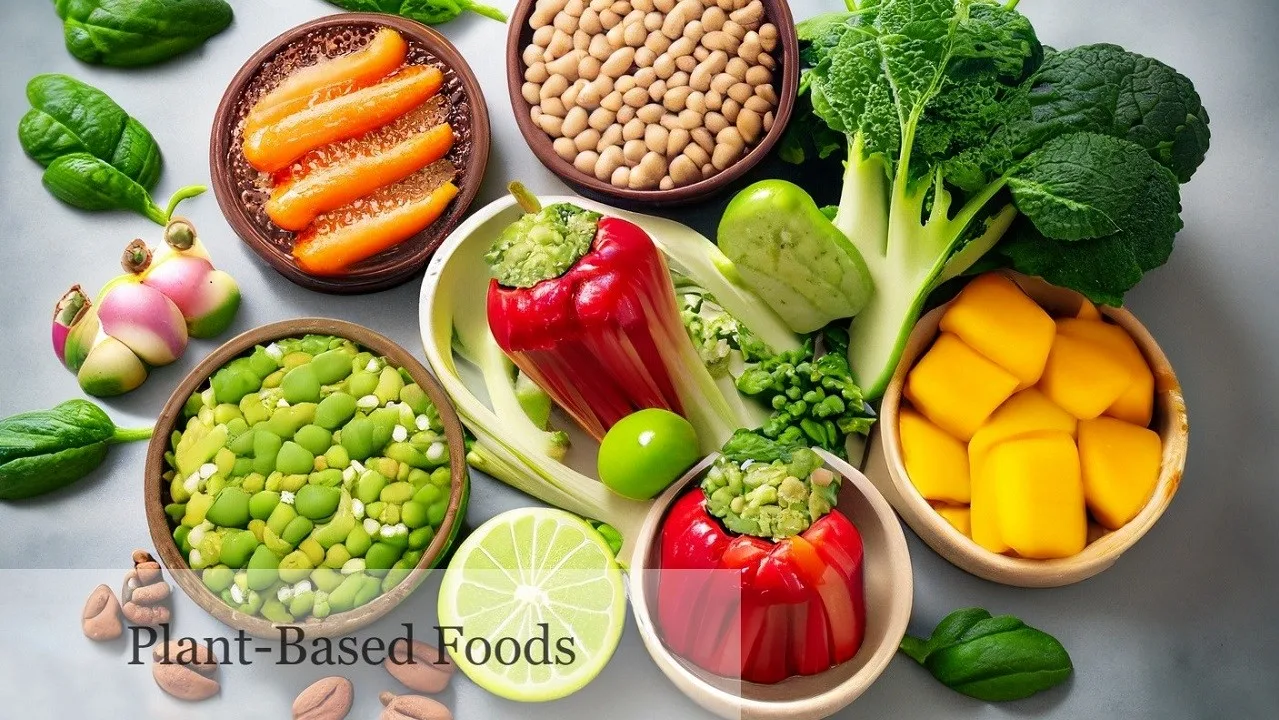Plant-Based Foods: Embracing a Healthier, Sustainable Lifestyle
In recent years, there has been a noticeable shift in dietary choices, with more individuals opting for plant-based foods. From celebrities to athletes and everyday people, the allure of a plant-powered diet has captured the attention of many. But what exactly are plant-based foods, and why are they gaining such popularity? In this article, we will explore the world of plant-based eating, its benefits, and the reasons behind its rise.
6. Gentle on Digestion
7. Radiant Skin and Ageless Beauty
Your dietary choices directly impact the health and appearance of your skin. The abundance of vitamins, minerals, antioxidants, and hydration found in plant-based foods can help nourish your skin from within. A plant-based diet promotes a youthful complexion, reduces the risk of skin issues, and enhances overall skin health.
Defining Plant-Based Foods
Plant-based foods refer to a dietary approach that primarily focuses on consuming foods derived from plants such as fruits, vegetables, legumes, nuts, and grains. While it does not necessarily exclude animal products entirely, the emphasis is on incorporating a wide variety of plant-based options into meals.
The increasing interest in plant-based diets can be attributed to several factors. Firstly, many individuals are drawn to the potential health benefits associated with plant-based eating. Scientific studies have shown that a well-balanced plant-based diet can support overall health, reduce the risk of chronic diseases, and aid in weight management.
Another significant driver behind the adoption of plant-based diets is the growing concern for the environment. Animal agriculture has been linked to deforestation, greenhouse gas emissions, and water pollution. By choosing plant-based foods, individuals can reduce their carbon footprint and contribute to a more sustainable food system.
Types of Plant-Based Foods
Plant-based foods encompass a wide variety of options that are derived from plants and are suitable for consumption by individuals following a vegetarian, vegan, or plant-based diet. Here are some common types of plant-based foods:
- Fruits: Apples, bananas, oranges, berries, grapes, mangoes, and other fruits are excellent sources of vitamins, minerals, and fiber.
- Vegetables: Broccoli, spinach, carrots, tomatoes, peppers, kale, cauliflower, and many other vegetables provide essential nutrients and are versatile for cooking.
- Legumes: Beans, lentils, chickpeas, peas, and soybeans are protein-rich plant foods that also provide fiber, vitamins, and minerals.
- Whole Grains: Quinoa, rice, oats, barley, wheat, and products made from these grains (such as bread, pasta, and cereals) are nutritious sources of carbohydrates, fiber, and various nutrients.
- Nuts and Seeds: Almonds, walnuts, cashews, chia seeds, flaxseeds, hemp seeds, and others are rich in healthy fats, protein, fiber, and minerals.
- Plant Oils: Olive oil, coconut oil, avocado oil, and other plant-based oils are used in cooking and as dressings, providing healthy fats and flavor.
- Plant-Based Proteins: Tofu, tempeh, seitan, and various plant-based meat substitutes made from soy, wheat, or pea protein are popular options for individuals seeking alternatives to animal products.
- Plant-Based Milk Alternatives: Soy milk, almond milk, oat milk, coconut milk, and other non-dairy milk substitutes are commonly used as alternatives to cow's milk.
- Plant-Based Sweeteners: Maple syrup, agave nectar, stevia, and other natural sweeteners derived from plants are used as alternatives to refined sugars.
- Plant-Based Condiments and Spices: Herbs, spices, soy sauce, tahini, mustard, and other plant-based condiments and seasonings enhance the flavor of dishes.
The Benefits of Plant-Based Foods
In a world where health-conscious choices are gaining momentum, plant-based foods have emerged as champions of nutrition. Packed with essential nutrients, vitamins, and minerals, these vibrant culinary delights offer a plethora of health benefits that can revolutionize your well-being. Join us as we delve into the remarkable health advantages of incorporating more plant-based foods into your diet.
Plant-based foods are becoming increasingly popular, and for good reason. They are a great source of nutrients, can help you lose weight, and can even reduce your risk of chronic diseases.
Here are some of the benefits of eating plant-based foods:
Here are some of the benefits of eating plant-based foods:
1. Boosting Overall Wellness
When you embrace a plant-based lifestyle, you provide your body with a wide array of vitamins, minerals, and antioxidants essential for optimal functioning. These nutrient-dense foods support your immune system, enhance digestion, promote cardiovascular health, and provide the energy you need for an active lifestyle.
2. Heart-Healthy Delights
Plant-based foods have been shown to contribute to a healthier heart. Their naturally low saturated fat and cholesterol content, coupled with high fiber and phytochemicals, can help lower the risk of cardiovascular diseases, including heart attacks and strokes. Incorporating plant-based foods into your diet can be a proactive step toward heart health.
3. Diabetes Management and Prevention
A plant-based diet can play a pivotal role in managing and preventing type 2 diabetes. The abundance of fiber, complex carbohydrates, and antioxidants in plant-based foods helps regulate blood sugar levels, improve insulin sensitivity, and reduce the risk of developing diabetes.
4. Weight Management Made Delicious
For those striving to maintain a healthy weight, plant-based foods offer a satisfying and nutritious solution. Loaded with fiber, water content, and essential nutrients, these foods can help you feel fuller for longer, curb cravings, and support weight management goals. Moreover, plant-based diets are generally lower in calorie density, making them an excellent choice for sustainable weight loss.
5. Powerful Protection Against Chronic Diseases
Studies have shown that plant-based diets can reduce the risk of chronic diseases, including certain types of cancer, obesity, and age-related macular degeneration. The antioxidants, phytochemicals, and anti-inflammatory properties present in plant-based foods provide powerful protection against cellular damage and promote overall wellness.
Plant-based foods are naturally rich in dietary fiber, which plays a vital role in maintaining a healthy digestive system. The fiber content aids in smooth bowel movements, prevents constipation, and fosters a balanced gut microbiome, contributing to optimal digestion and absorption of nutrients.
If you are considering making a switch to a plant-based diet, there are a few things you should keep in mind. First, it is important to make sure you are getting enough protein. You can get protein from plant-based sources such as beans, lentils, tofu, tempeh, and nuts. Second, you need to make sure you are getting enough iron. You can get iron from plant-based sources such as leafy green vegetables, beans, lentils, and fortified cereals. Finally, you need to make sure you are getting enough vitamin B12. Vitamin B12 is essential for good health, but it is not found in plant-based foods. You can get vitamin B12 from fortified cereals, nutritional yeast, and supplements.
Embracing a Plant-Powered Lifestyle
Making the switch to a plant-based diet can be a great way to improve your health and well-being. There are many resources available to help you make the transition, and there are many delicious and satisfying plant-based foods to choose from.Incorporating plant-based foods into your daily life doesn't have to be overwhelming. Here are some practical steps to get started:
- Fill Your Plate with Plants: Make fruits, vegetables, whole grains, and legumes the foundation of your meals. Experiment with new recipes and flavors to discover exciting plant-based options.
- Gradual Transition: Start by incorporating plant-based meals a few times a week and gradually increase their frequency. This approach allows for a smoother transition and gives you the chance to explore new ingredients and cooking techniques.
- Explore Meat Alternatives: With the rise of plant-based meat alternatives, it's easier than ever to find delicious plant-based alternatives to traditional meat products. Explore options such as tofu, tempeh, seitan, and plant-based burgers to add variety to your meals.
- Educate Yourself: Stay informed about plant-based nutrition to ensure you meet your dietary needs. Consult reputable sources, consider working with a registered dietitian, and be mindful of getting a balanced mix of macronutrients and micronutrients.
Conclusion
Embracing a plant-based lifestyle can have profound benefits for your health and the planet. By shifting towards a diet rich in plant-based foods, you can enjoy the advantages of improved well-being, reduce environmental impact, and contribute to a more sustainable future. Start small, explore new flavors, and witness the transformative power of plant-based eating.


Post a Comment